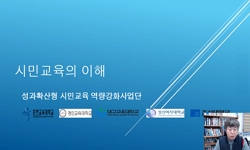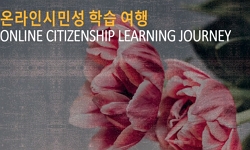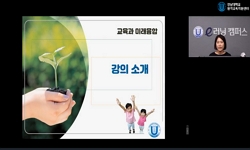This research sets out to investigate the status and characteristics of citizenship education in the UK with the aim of offering implications for citizenship education in Korea. In England, prior to the late 1980s, there was no statutory National Curr...
http://chineseinput.net/에서 pinyin(병음)방식으로 중국어를 변환할 수 있습니다.
변환된 중국어를 복사하여 사용하시면 됩니다.
- 中文 을 입력하시려면 zhongwen을 입력하시고 space를누르시면됩니다.
- 北京 을 입력하시려면 beijing을 입력하시고 space를 누르시면 됩니다.

영국 학교 시민교육의 제도화와 현황에 대한 분석 = Analyzing the Status and Characteristics of Citizenship Education in the UK: What Lessons Can be Drawn for Citizenship Education Initiatives in Korea
한글로보기https://www.riss.kr/link?id=A107059942
- 저자
- 발행기관
- 학술지명
- 권호사항
-
발행연도
2020
-
작성언어
Korean
- 주제어
-
등재정보
KCI등재
-
자료형태
학술저널
- 발행기관 URL
-
수록면
119-154(36쪽)
-
KCI 피인용횟수
0
- DOI식별코드
- 제공처
-
0
상세조회 -
0
다운로드
부가정보
다국어 초록 (Multilingual Abstract)
This research sets out to investigate the status and characteristics of citizenship education in the UK with the aim of offering implications for citizenship education in Korea. In England, prior to the late 1980s, there was no statutory National Curriculum for school subjects, including citizenship education. By the start of the 1990s, growing evidence of a decline in civic engagement such as low voter turnout among young people and detachment of the youth from politics in general, caused some alarm. In addition to this, other pressing issues which reflect the progression of globalization and a multicultural society such as the need to enhance community cohesion and build a sense of the value of cultural diversity, helped citizenship education stay on the political agenda. Amongst the citizenship education initiatives is the Crick Report (1998) which provided the framework for citizenship education through defining the directions and key concepts of citizenship education in schools. Since the introduction of citizenship education as a new statutory subject at the secondary level in 2002, the focus of citizenship education as a school subject can be summarized as linking the acquisition of civic knowledge with the development of active citizenship. Importantly, the implementation of citizenship education in the UK is interwoven with community involvement, which is characterized by the active use of resources outside of school in the local community. Considering the problematic nature of hierarchically imposed citizenship education initiatives in Korea, more attention needs to be drawn to the importance of fostering political literacy through the promotion of community involvement. which is viewed as one of the key objectives of citizenship education in the UK.
국문 초록 (Abstract)
이 연구는 영국 학교 시민교육의 제도화 과정과 현황을 분석하여 그 특징을 파악하고 우리나라 학교 시민교육에 주는 시사점을 추출하는 것을 목적으로 한다. 영국에서는 1980년대까지 민주...
이 연구는 영국 학교 시민교육의 제도화 과정과 현황을 분석하여 그 특징을 파악하고 우리나라 학교 시민교육에 주는 시사점을 추출하는 것을 목적으로 한다. 영국에서는 1980년대까지 민주적인 정치 과정과 문화에 대한 신뢰 속에 학교에서 시민교육을 제도화하지 않았다. 그런데 1990년대부터 청년층의 낮은 투표율 등으로 민주주의 위기가 감지되고 세계화와 다문화 사회의 진전으로 인해 자국 내의 인종 및 문화의 다양성이 증가하면서 학교 시민교육에 대한 관심이 높아졌다. 이에 영국에서는 크릭 보고서 등을 통해서 학교 시민교육의 방향과 핵심 요소를 정하고, ‘시민교육’ 교과목을 구심점으로 교과 및 교과 외 활동 등을 통해서 학교 시민교육을 강화하였다. 그러나 영국의 학교 시민교육은 기존의 사회적 전통에 따라 학교뿐만 아니라 학교 밖 자원을 적극적으로 활용하고 있다. 이러한 영국의 학교 시민교육은 정치적 논쟁의 극복, 시민교육을 위한 국가정책 수립, 학교와 학교 밖 자원의 연계, 현장 체험 및 실천 중심 교육의 특징을 띠고 있다. 이러한 특징은 우리나라 학교 시민교육에 정치ㆍ사회적 합의, 체계적인 학교 시민교육 정책 수립, 학교와 학교 밖의 협력, 체험과 실천 중심 교육 강화 등 여러 시사점을 제공한다. 따라서 최근 들어 민주화의 진전에도 불구하고 여전히 국가 및 정부 주도 하에 학교 및 교과 위주의 시민교육을 추진하고 있는 우리나라 현실에서 영국 시민교육의 접근 방식은 유용한 참고가 될 수 있다.
참고문헌 (Reference)
1 강대현, "한국시민교육에 대한 사적 고찰 -학교시민교육의 변천과정을 중심으로-" 한국사회과교육학회 33 : 1-22, 2001
2 이한규, "한국과 독일에 있어서 수요자 중심의 민주시민교육- ‘비판적 사고’(Critical Thinking) 모델" 한독사회과학회 21 (21): 3-26, 2011
3 민주화운동기념사업회, "학교시민교육과 민주주의"
4 정문성, "학교 민주시민교육을 위한 교육과정 개선 방안 연구" 교육부 2018
5 경향신문, "인헌고 사태, ‘반진보 10대 정체성’의 탄생?"
6 강호원, "영국의 학급 편성 및 운영체계"
7 한규선, "영국의 정치교육: 시티즌십 교육의 국가교육과정 필수교과 제정을 중심으로" 12 : 45-76, 2013
8 정재원, "영국의 시민교육 제도화에 관한 연구" 인문사회과학연구소 (38) : 5-37, 2013
9 정재원, "영국의 시민교육 거버넌스 분석과 시사점" 한국시민윤리학회 26 (26): 1-23, 2013
10 송현정, "영국 시민교육의 현황 분석 연구: 영국 시민교육의 특징과 시사점" 2020
1 강대현, "한국시민교육에 대한 사적 고찰 -학교시민교육의 변천과정을 중심으로-" 한국사회과교육학회 33 : 1-22, 2001
2 이한규, "한국과 독일에 있어서 수요자 중심의 민주시민교육- ‘비판적 사고’(Critical Thinking) 모델" 한독사회과학회 21 (21): 3-26, 2011
3 민주화운동기념사업회, "학교시민교육과 민주주의"
4 정문성, "학교 민주시민교육을 위한 교육과정 개선 방안 연구" 교육부 2018
5 경향신문, "인헌고 사태, ‘반진보 10대 정체성’의 탄생?"
6 강호원, "영국의 학급 편성 및 운영체계"
7 한규선, "영국의 정치교육: 시티즌십 교육의 국가교육과정 필수교과 제정을 중심으로" 12 : 45-76, 2013
8 정재원, "영국의 시민교육 제도화에 관한 연구" 인문사회과학연구소 (38) : 5-37, 2013
9 정재원, "영국의 시민교육 거버넌스 분석과 시사점" 한국시민윤리학회 26 (26): 1-23, 2013
10 송현정, "영국 시민교육의 현황 분석 연구: 영국 시민교육의 특징과 시사점" 2020
11 Citizenship Foundation, "영국 시민교육 지침서"
12 강대현, "영국 시민교육 사례 분석 연구: 영국 시민교육의 특징과 시사점" 여수시 국제교육원 113-118, 2019
13 박장호, "영국 도덕 교육의 교육과정" 한국윤리교육학회 (3) : 226-247, 2003
14 권순정, "영국 국가 정치 상황에 따른 시민교육 핵심개념 분석: 학교 교육과정정책 내용을 중심으로" 한국비교교육학회 29 (29): 1-28, 2019
15 권진욱, "시민사회의 시민교육 체계 구축과정 연구: 독일, 프랑스, 스웨덴, 미국, 영국을 중심으로" 민주화운동기념사업회 한국민주주의연구소 163-209, 2016
16 Heater, D, "시민교육의 역사" 한울아카데미 2007
17 김미란, "시민·사회단체의 시민교육현황 분석" 梨花女子大學校 社會福祉大學院 1998
18 교육부, "민주시민교육 활성화를 위한 종합계획"
19 강영혜, "민주시민교육 활성화 방안 연구" 한국교육개발원 2011
20 홍은영, "문화적 실천으로서 독일의 정치교육 혹은 민주시민교육 - 제도적 이상과 현실" 인문학연구원 (17) : 289-320, 2016
21 이상오, "독일의 학교민주주의와 시민교육에 대한 연구" 한독교육학회 19 (19): 23-52, 2014
22 신용민, "독일과 한국의 성인 시민교육 비교연구 - 라이프치히 시민대학과 진주의 평생교육원 교육프로그램을 중심으로" 한국독일어문학회 25 (25): 87-108, 2017
23 허영식, "독일 학교 민주시민교육" 51-72, 2017
24 Ruminski, E., "독일 통일 후 정치재단의 민주시민교육의 역할" 13 (13): 109-120, 2012
25 양흥권, "독일 정치교육 사례에 기반한 한국의 민주시민교육 모형 탐색 연구" 원격교육연구소 10 (10): 77-104, 2014
26 서강식, "교과서 분석을 중심으로 한 영국의 도덕교육 고찰" 한국도덕윤리과교육학회 (57) : 131-157, 2017
27 선거연수원, "각국의 민주시민교육 프로그램" 해외연구관 16-32, 2014
28 옥일남, "‘학교 민주시민교육의 유형과 전략’ 토론 원고" 일산, KINTEX 제2전시장 107-117, 2019
29 Kisby, B., "‘Politics is ethics done in public’: Exploring linkages and disjunctions between citizenship education and character education in England" 16 (16): 8-21, 2017
30 "Young Citizens"
31 Fiehn, J, "This is Citizenship: teacher’s resource book" John Murray 2002
32 Fiehn, J, "This is Citizenship 3" Hodder Education 2013
33 Fiehn, J, "This is Citizenship 2" Hodder Education 2013
34 Fiehn, J, "This is Citizenship 1" Hodder Education 2014
35 Whitmarsh, G., "The Politics of Pollitical Education: An Episode" 6 (6): 133-142, 1974
36 Osler, A., "The Crick report: Difference, equality and racial justice" 11 (11): 25-37, 2000
37 Paton, G., "Teachers being turned into social workers, warns Michael Gove"
38 Whitty, G, "Real Decision Making? School Councils in Action" Institute of Education, University of London
39 Kerr, D., "Pupil assessment in citizenship education: purposes, practices, and possibilities" NFER 2009
40 Crick, B, "Political Education and Political Literacy" Longman 1978
41 Brighouse, H., "On Education" Routledge 2006
42 "NCS"
43 Phillips, T., "Multiculturalism’s legacy is “Have a nice day” racism"
44 Weinburg, J, "Learning for democracy: The politics and practice of citizenship education" 44 (44): 573-592, 2018
45 Moorse, L., "GCSE citizenship studies – taking citizenship action" 46 : 44-51, 2017
46 AQA, "GCSE Citizenship Studies(8100) Specification"
47 AQA, "GCSE Citizenship Studies Paper 1: specimen question paper"
48 AQA, "GCSE Citizenship Studies Paper 1: question paper"
49 Whiteley, P., "Does Citizenship Education Work? Evidence from a Decade of Citizenship Education in Secondary Schools in England" 67 : 513-535, 2014
50 Starkey, H., "Diversity and citizenship in the curriculum" 6 (6): 5-10, 2008
51 Lang, S., "Democracy is not boring" 96 : 6-12, 1999
52 Davies, I, "Current challenges for citizenship education in England" 5 (5): 20-36, 2016
53 Qualifications and Curriculum Authority, "Citizenship: Programme of study for key stage 3"
54 Kisby, B, "Citizenship, Democracy and Education in the UK: Towards a Common Framework for Citizenship Lessons in the Four Home Nations" 65 (65): 68-89, 2012
55 Arthur, J., "Citizenship through Secondary History" Routeledge Falmer 2001
56 Department for Education, "Citizenship programmes of study: key stages 3and 4: National Curriculum in England"
57 Keating, A., "Citizenship education in England 2001-2010: young people’s practices and prospects for the future: the eighth and final report from the Citizenship Education Longitudinal Study (CELS)" Department for Education 2010
58 Oster, A, "Citizenship education and national identities in France and England: Inclusive or exclusive?" 27 (27): 287-305, 2001
59 Department for Education, "Citizenship Studies: GCSE subject content"
60 Parliament UK, "Chapter 3: Education–the key building block"
61 Clarke, H. D., "Campaigning for Change: The Dynamics of Electoral Choice in Britain" Cambridge University Press 2013
62 한국교육과정평가원, "2010 교육과정․교육평가 국제동향 연구 사업: 영국" 한국교육과정평가원 2010
동일학술지(권/호) 다른 논문
-
2009 개정 사회과 교육과정 성취기준에 대한 중학생 학업성취 분석 : 2015∼2018년 국가수준 학업성취도 평가 결과 분석을 중심으로
- 한국사회과교육학회
- 성경희
- 2020
- KCI등재
-
PISA 2015 협력적 문제해결력 영역 결과에 나타난 우리나라 학생들의 성취 특성 분석 : 성취 상위국과의 비교를 중심으로
- 한국사회과교육학회
- 이소연
- 2020
- KCI등재
-
사회지배성향과 미디어 노출이 청소년의 제노포비아에 미치는 영향 : 이방인에 대한 공감의 매개효과
- 한국사회과교육학회
- 황미애
- 2020
- KCI등재
-
한국 민주시민교육의 정치학 : 보수·진보 진영의 학교 민주시민교육 정책 분석(2003-2020)
- 한국사회과교육학회
- 박상영
- 2020
- KCI등재
분석정보
인용정보 인용지수 설명보기
학술지 이력
| 연월일 | 이력구분 | 이력상세 | 등재구분 |
|---|---|---|---|
| 2027 | 평가예정 | 재인증평가 신청대상 (재인증) | |
| 2021-01-01 | 평가 | 등재학술지 유지 (재인증) |  |
| 2019-06-28 | 학회명변경 | 영문명 : 미등록 -> Korea Association of Social Education |  |
| 2018-01-01 | 평가 | 등재학술지 유지 (등재유지) |  |
| 2015-01-01 | 평가 | 등재학술지 유지 (등재유지) |  |
| 2011-01-01 | 평가 | 등재학술지 유지 (등재유지) |  |
| 2009-01-01 | 평가 | 등재학술지 유지 (등재유지) |  |
| 2007-01-01 | 평가 | 등재학술지 유지 (등재유지) |  |
| 2004-01-01 | 평가 | 등재학술지 선정 (등재후보2차) |  |
| 2003-01-01 | 평가 | 등재후보 1차 PASS (등재후보1차) |  |
| 2000-07-01 | 평가 | 등재후보학술지 선정 (신규평가) |  |
학술지 인용정보
| 기준연도 | WOS-KCI 통합IF(2년) | KCIF(2년) | KCIF(3년) |
|---|---|---|---|
| 2016 | 1.5 | 1.5 | 1.5 |
| KCIF(4년) | KCIF(5년) | 중심성지수(3년) | 즉시성지수 |
| 1.4 | 1.35 | 1.812 | 0.28 |




 KCI
KCI KISS
KISS






